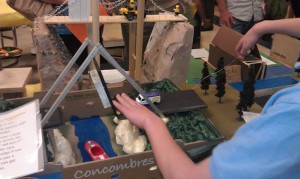Disclosure: I was compensated for writing this post.
I’ve done it. I’m sure you’ve done it too. As parents, we’ve all done it at one time or another.
Scene: Your home.
Your child struggles zipping his coat. You see your child tugging the zip up and down but not getting the coat zipped. He pulls and he tugs with all his might. You watch for a few seconds. You consider intervening. You let him keep tugging. But you can’t stand it any longer. The coat must get zipped right now! No time to waste. You swoop in. You say to your child “Here let me zip that for you.” You zip that jacket all the way up. Your child is happy. You are relieved. The coat is zipped. And Scene.
You zipped that coat because you were in a rush to run errands. You zipped that coat because it is easier than waiting for your child do it himself. You zipped that coat because the sight of your child struggling with a relatively simple task was too much too handle. You justify your actions by saying that your child partially zipped up his coat while you only “helped.” Right. You zipped that zipper rather than let your child fail.
Whether your child is doing a simple task like zipping a coat or a more complicated task, like studying for a math test, your natural instinct as a parent is to help. You want to help them do a good job. You want them to succeed. You want them to do their best. You don’t want them to fail. We don’t want our child’s feelings to be hurt. We don’t want our child to struggle. We want to make life just a little easier for our children…and if we are honest we want to make life easier for us, too.
Helping your child complete a small task is no big deal. Zipping a coat is a small task in the grand scheme of things. But those small tasks get bigger as your child gets older. Zipping a jacket today becomes writing a report tomorrow. Writing a report becomes doing an experiment for the Science Fair. The Science Fair experiment becomes a college admissions essay. And so on and so on.
One of my children loves a challenge. Wants to do her best. When she boarded the kindergarten bus, she did not so much as give my husband and I a backward glance. That child has taken on every challenge presented to her with gusto and enthusiasm. She thrives on learning new concepts, so it was shocking to find out from her high school teacher that she was struggling with an assignment. A multi-step project had been assigned in September. The teacher shared at a meeting in November that she had barely completely any of the steps even though the deadline was fast approaching.
My husband and I were faced with a dilemma. A dilemma faced by parents all the time. We had to decide would we help our child out of her predicament she was in by doing the assignment for her? Or would we stand back and let her sort out the situation on her own? You know which path we took, don’t you? Much as it would have been easier to take over the assignment. Complete this step and that step. Create a poster board. How would this have helped our daughter?
As the tasks and projects get bigger, we as parents need to take a step back. It’s hard. Your natural instinct is to rush in. Do the work for your child. It’s tempting to continue “zipping the zipper” as homework assignments and projects loom on the horizon, but that doesn’t help your child. You need to let your child do his own work. You need to let your child do the work. You need to let the chips fall where they may. You need to give assistance as needed but you should not do the child’s work for her. And as hard as it is to admit, and even harder to actually do, you need to let your child fail.
At some point, you won’t be with your children. They will be away at college. Or in the workforce and you won’t be there to bail them out. So you need to give your child the tools and help to do his best, but don’t ever do your child’s work.
Did you know that GreatSchools.org is one of the most visited sites by women 25-49? I know I did not know this, though I have visited GreatSchools.org many times to check out preschools, elementary schools, middle schools, and even high schools. A recent Google+ #emotionalsmarts hangout featured the topic…letting kids fail & grow, as well.
- Like Great Schools on Facebook.
- Follow @GreatSchools on Twitter.
- Follow Great Schools on Pinterest.
- Subscribe to Great Schools on YouTube.



